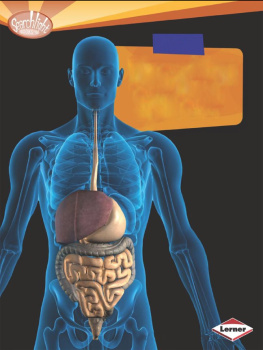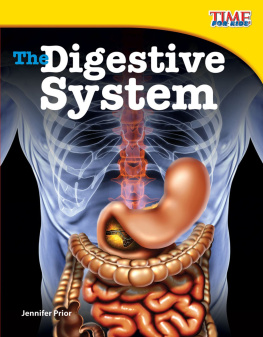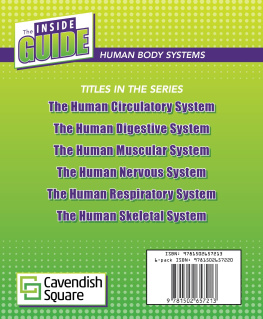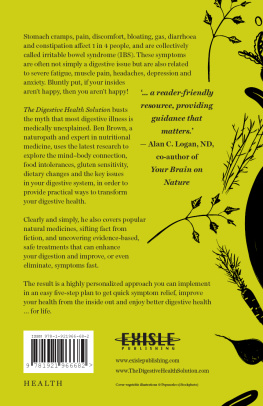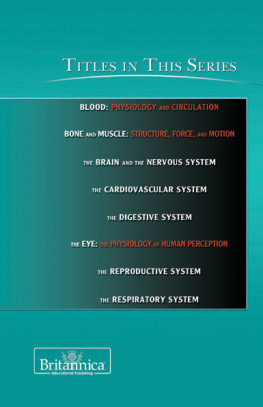DIGESTIVE
INTELLIGENCE
A HOLISTIC VISION OF YOUR SECOND BRAIN
DIGESTIVE
INTELLIGENCE
A HOLISTIC VISION OF YOUR SECOND BRAIN
IRINA MATVEIKOVA, MD

Irina Matveikova 2014
The right of Irina Matveikova to be identified as the author of this work has been asserted by her in accordance with the Copyright, Designs and Patents Act 1998.
Published in 2014 by Findhorn Press, Scotland
ISBN 978-1-84409-643-5
All rights reserved.
The contents of this book may not be reproduced in any form, except for short extracts for quotation or review, without the written permission of the publisher.
A CIP record for this title is available from the British Library.
Translated from the Spanish by Nick Inman
Edited by Nicky Leach
Front cover design and illustrations by Richard Crookes
Front cover photograph by Ksenia Kalinina
Interior design by Damian Keenan
Printed in the USA
Published by
Findhorn Press
117-121 High Street,
Forres IV36 1AB,
Scotland, UK
t +44 (0)1309 690582
f +44 (0)131 777 2711
e
www.findhornpress.com
CONTENTS
To the wisdom of nature
Acknowledgments
S ome years ago, I took part in a medical conference in Biarritz, France. On the last night, during a magnificent gala dinner, I found myself sitting around a large table with eight colleagues and friendsall of us doctors, scientists, and business people from different countries who had known each other for some time. After coffee was served, we sat a while in silence, thoughtful but close in spirit, then suddenly we began to play a game, one that consisted of talking about our dreams and how we saw ourselves in 10 years time. What did each of us hope to become, and what would we like to be doing for a living?
We allowed ourselves to be carried away by our dreams in complete freedom. It was a very tender and beautiful momenta very rare experience for this group of mature people used to the world of business and routine. Why not, we thought? Tomorrow we would take our planes home, back to our responsibilities, but tonight we could allow ourselves the luxury of being open and sincere. The magic affected us all.
Each of us sat for a moment, with eyes closed and a gentle smile on the lips. Then, one by one, we listened to the inspiring stories of each person at the table, and the fantasies and dreams that he or she wanted to make a reality over the next decade.
I closed my eyes and allowed my imagination and my most intimate thoughts to fly freely. When it came to my turn to speak, I let myself go for the first time in my life and said aloud that I wanted to be a writer. I could imagine myself writing a book with great enthusiasm and professional pleasure. I saw myself in a very light place, in the sunshine, hearing the sound of the sea. I could visualize large windows and white curtains. I felt a sensation of fullness and satisfaction infusing my work and life. This dream seemed just that, thoughan impossible and distant dream.
Now, all these years later, I offer you my first book. The original version was written in Spanish, a language that I did not know when I was at that conference in Biarritz, and never expected to learn, and here it has been translated into English. Today I live in Spain, even though at the time I could not have imagined in my wildest dreams that I would move from Prague to Madrid. Right now, I am looking at the Sierra de Madrid through large windows bordered by white curtains. I cant hear the sea, but I love this place where I now live.
I would like to share with you this magical transformation that I have had the privilege to live through in my normally busy and unpredictable life. I could never have imagined that the dreams I spoke of on that night spent with friends in Biarritz in 1999 would come true. Perhaps my desire to change was so intense that in the heat of the moment I made my choices and set my priorities without being aware of it.
I would like to say thank you especially to Mnica Liberman of the publishers La Esfera de los Libros, and to my Spanish editor Daniel Chumillas for his confidence and great patience. He believed in my project and gave this book a chance.
I would also like to thank some other important people: Carlos, my partner and teacher, without whom I would not be where I am; Vlad, my son and supporter, who motivates me to grow, to learn, and to keep abreast of the modern world; and my patient and wise mother, so committed to the family.
I owe gratitude, too, to all the teachers I have had, who at different times and in their distinct ways appeared in my path and shared their wisdom with me: my special master of medicinal plants, Carlos Andrin; my mentor and excellent therapist, Daniel Chumillas; the solitary philosopher Gustavo Muoz; Jess Valverde, friend and wise doctor; Darina Blahova, who breathes life in deeply and appreciates every moment of it; Andrei Matveikov, who helped me and supported me during a quantitative leap, both personal and work-related; Dr. Santiago de la Rosa for professional support; to my literary agent Elizabeth Wiggins for her great support and help; and to many, many more people.
I want to also thank my patientsmany now friendswho accepted me with open arms and much curiosity and placed their confidence in me. They have helped me greatly and co-operated with me. In particular, I must thank those who have given me their testimonies in such a generous way: Yuyi Beringola, for the foreword; Teresa Bueyes; Joana Bonet; Miguel ngel Sol; Rosa de la Torre; Dr. Ana Mara Ruiz Sancho; Dr. Jos Hernndez Maraver; Jos Antonio Hernndez Martn; Dr. Luis Bril; Pablo Pinilla; Paula Martnez; and those others who prefer to remain anonymous.
Finally, of course, I must express my gratitude to the rebelliousness of my own digestive system, which stimulates me, encourages me, and motivates me to continue learning about this hidden but intelligent being found in our gut.
Foreword
W hen I was 12 years old, family problems made me very depressed, and I started to have terrible stomach pains. I was diagnosed with the beginnings of a duo-denal ulcer, and I was put on a diet that I have mostly kept to ever since.
When I was 15, I lost my biological father, my marks at school went down from very good to just average, and then I started to have biliary colic pain, which left me feeling like a wreck. So I have absolutely no doubt that emotion and digestion are very closely related to each other.
After these colic episodes I was diagnosed with a lazy gallbladder, and the doctors told me that I also had a very sluggish liver. These are obviously things that dont show up on an ultrasound scan and at first sight dont seem too serious, but it is certainly true that all my life I have suffered from severe headaches, sometimes with such terrible nausea that I cant eat anything for weeks on end.
I work in the film business as a script supervisor and love my job, but it is not exactly the best thing for my digestionirregular hours, filming at night for weeks on end; sometimes its too hot, other times its too cold; far too much traveling... but Ive always tried to look after myself as best I can. My colleagues joke about me sometimes and say that Im going to live forever like that, but thats not my aim. What I want is to live well. By that I mean enjoying my job and my life for as long as I can.
Perhaps I am aware of the importance of looking after myself because of my mothers story. She was a marvelous woman, full of energy, but she never took much care of herself and, at the age of 75, she had an intestinal obstruction, the result of chronic constipation, and had to have an emergency operation. She then had to have a second operation two years later, because something had come loose. Before these two operations I remember how she was the very last to leave the reception at my brothers wedding. Afterwards, she was never the same again.
Next page

